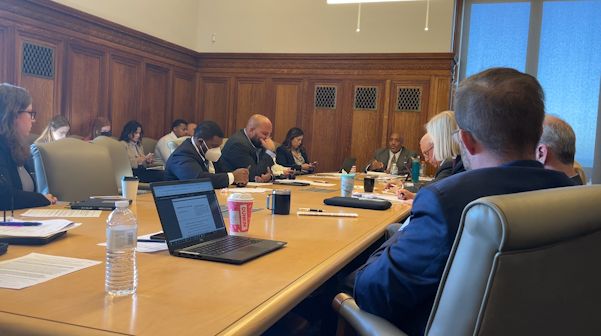CLEVELAND — In a caucus Monday, Cleveland City Council discussed potential changes to tighten public comment rules.
The most significant change discussed was limiting comments to only items that are under council’s consideration.
Under council’s current public comment rules, those who sign up to speak can discuss any issue, as long as they don’t name individual council members or invoke hate speech.
The new rule would only allow comments related to the legislation council is considering or issues council members are discussing.
It’s still unclear who would determine what topics fall under those guidelines.
The new rules would also allow the sitting council president to cut the mics of those who break the rules and pause public comment if needed.
The changes, which got mixed reviews from council members in the meeting, were not voted on Monday night, as council is still in need of further discussion to finalize the revisions they want to propose and ensure they are constitutional.
“It has always been council’s intent to make sure that public comment and everyone’s freedom of speech is allowed,” Council President Blaine Griffin said. “However, we have seen that there is a need, for several reasons, to really make sure that we revisit our rules.”
Back in September, Griffin cut off resident Chris Martin’s mic during public comment for reading the names of council members who received donations to the council leadership fund, a political action committee handled by the sitting council president.
Attorneys with the Case Western Reserve University’s First Amendment Clinic are representing Martin and warned council that current rules could violate the U.S. Constitution.
In Monday’s caucus, city council’s attorney argued the new rules would be legal, since they are limiting topics of discussion to city business and not viewpoints.
In the past four council meetings, Palestinian supporters have packed council chambers, using public comment to ask city leaders like Mayor Justin Bibb, who tweeted in support of Israel after the Hamas attack that sparked the conflict, to issue a statement in support of their Palestinian constituents.
Griffin said the rule changes have been in discussion since September and are not the result of the recent council meetings.
However, he added that those meetings have gotten contentious, leaving some people in city hall feeling unsafe and said that’s unacceptable.
Council member Rebecca Maurer, who represents Ward 12, said she strongly opposes all the changes discussed, especially when community members are packing council chambers to engage with city leaders.
“I don’t support these changes,” she said. “I think they are a terrible idea. It’s honestly disrespectful to our residents.”
She said the rule changes make council look like they’re “running scared” from comments they disagree with, which drew a strong reaction from several men on council, including Council member Anthony Hairston and President Griffin, who said he isn’t scared of anybody.
Griffin called Maurer’s remarks “disingenuous” and “asinine” for going after colleagues.
Several members also expressed concerns about people who live outside of Cleveland filling the limited public comment slots in each meeting before residents can sign up.
“I’m tired of people who are enthusiastic about Cleveland but not enthusiastic enough to live in it,” Ward 17 Council Member Charles Slife said.
Council’s attorney said banning people who live outside of Cleveland from speaking would be illegal, since they may work, own a business or otherwise be involved in city business in other ways.
Cleveland city council only started including a public comment section in 2021, after a citizen-led coalition pushed for it.
Correction: A previous version of this story misspelled the name of council member Anthony Hairston. This error has been corrected. (Nov. 15, 2023)



